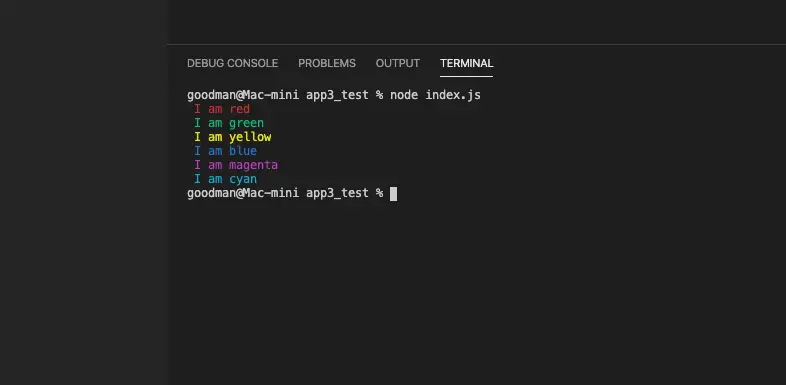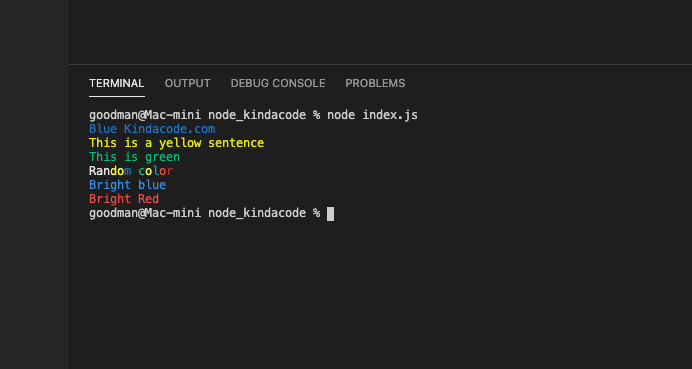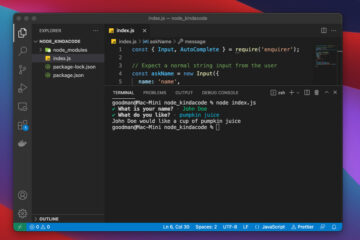By default, when you print out something by using console.log() in Node.js, the output is usually white if your terminal has a dark background color or black if your terminal has a light background color. If you print a few short messages using console.log(), there will be nothing to worry about. However, when you print some long text, it may become a mess and hard to read.
This article shows you 2 techniques to colorize your console log output messages. The first one is to use self-written code and the second one is to make use of a third-party library.
Using self-written code
You can add colors to console messages by using the ANSI escape code. The syntax is simple as follows:
console.log('[color code]', 'your text here');Note: You can find more color codes on this GitHub page or this Wikipedia article
For example, we’ll create a file called index.js and put into it some code like this:
// red
console.log('\x1b[31m%s\x1b[0m', 'I am red')
// green
console.log('\x1b[32m%s\x1b[0m', 'I am green')
// yellow
console.log('\x1b[33m%s\x1b[0m', 'I am yellow')
// blue
console.log('\x1b[34m%s\x1b[0m', 'I am blue')
// magenta
console.log('\x1b[35m%s\x1b[0m', 'I am magenta')
// cyan
console.log('\x1b[36m%s\x1b[0m', 'I am cyan')Execute the code by typing the following command in the terminal window:
node index.jsAnd here is the result:

Remembering 3 to 5 color codes is enough for most of us. However, in case you don’t want to get the job done in a more convenient way, see the next section.
Using a third-party package
Using a package saves you from having to remember the syntax as the first method. There are many famous names that meet our needs such as colors, chalk, etc. The example below will use the colors library.
Install:
npm i colorsSyntax:
console.log('your-string'.[color-name]);Use:
const colors = require('colors');
console.log('Blue Kindacode.com'.blue);
console.log('This is a yellow sentence'.yellow);
console.log('This is green'.green);
console.log('Random color'.random);
console.log('Bright blue'.brightBlue);
console.log('Bright Red'.brightRed);Output:

Below is the list of colors supported by the library:
- black
- red
- green
- yellow
- blue
- magenta
- cyan
- white
- gray
- grey
- brightRed
- brightGreen
- brightYellow
- brightBlue
- brightMagenta
- brightCyan
- brightWhite
To explore more options, see the official docs.
Conclusion
We have walked through 2 approaches to colorizing console messages in Node.js. From now on, you will get a nicer experience when developing and debugging applications. If you would like to explore more new and engaging things about Node.js and related stuff, take a look at the following articles:
- Using Axios to download images and videos in Node.js
- 2 Ways to Set Default Time Zone in Node.js
- 7 Best Open-Source HTTP Request Libraries for Node.js
- Node.js: Get File Name and Extension from Path/URL
- Top best Node.js Open Source Headless CMS
- How to get all Links from a Webpage using Node.js and Cheerio
You can also check out our Node.js category page for the latest tutorials and examples.



























hello, could you please explain that formatter in the log
Hello. I’ve updated the explanation
Thanks
[…] See also: Colorizing the console log output in Node […]